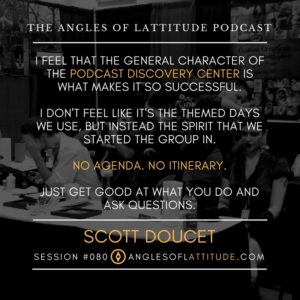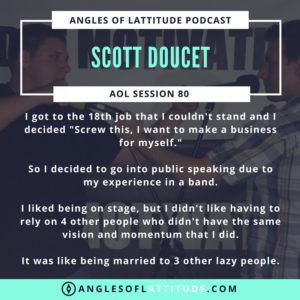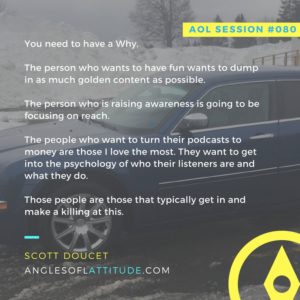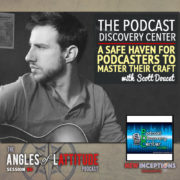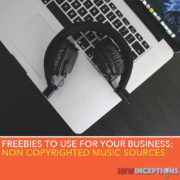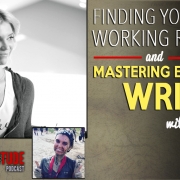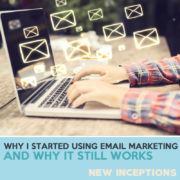No matter who you are or what you’re doing, those of us who are leading (or trying to lead) passion filled lives and businesses are doing so because we feel that we can be ourselves better than what a boss can prescribe for us. We’re trying to gain our Personal Independence, or as most call it, Personal Freedom. Most people don’t like being bossed around, right? (Obviously there’s an exception. But I have yet to meet that person…!)
Until you have personal freedom, you’re always going to have that as a possibility in your life.
In the last post, I spoke of 4 common problems that people have when trying to start a business. These problems are part of a larger list of obstacles that I want to point out in today’s post. Without overcoming these obstacles through actively working on them, or simply through understanding them, a person can never have true Personal Freedom.
Health
The first thing everyone should be able to maintain at an optimum level is their health – both physical and mental. This is the first level of Maslow’s Hierarchy of Needs. Due to this, many of us who are thinking about building a business take this part for granted. However, ignoring it can have a very negative impact on everything else we do.
In fact, if a person doesn’t have their sanity or the energy to do the activities that need to be done in a certain day, then they won’t get very far.
For many people this is a daily struggle. These people are living a Caged Life. Combined with the potential of not having shelter (the second level of Maslow’s), these folks might not ever think about starting their own business.
That said, one good thing that comes from having to struggle daily is a natural tenacity for “Hustle”. And, ironically, that’s an important ingredient to building a business.
Community
The third level of Maslow’s Hierarchy of Needs is Love and Belonging. Once we have ourselves taken care of, we naturally want to start reaching out to others. Our need to engage with others is part of what it means to be human. We want to feel connected to people who are interested in the same things we are. I like to think of this as a need for us to feel that we have social proof. That we’re not alone.
As mentioned in the 6 Cornerstones eBook, a tribe is a very good thing to have when we’re aiming for higher success – it gives us support for when the going gets tough!
If this is done with authenticity, it gives us a feeling of esteem (Maslow’s fourth level) because we know that people appreciate the true us!
Once we have our health and know our role in our community, you could say that we’re experiencing a Comfortable Life. Life is good, but it’s not great. And funny enough, it’s been said numerous times that Good is, in fact, the enemy of Great. It’s really hard to give up Comfortable for what’s coming next…
Knowledge and Skills
On the top of Maslow’s Hierarchy of Needs is Self Actualization. This is where we start realizing who we are. That we do have passions, particular strengths, and know where we fit in life. It’s when we have this understanding, that we can master our knowledge and build other skills that will supplement what we already know about ourselves and how we interact with the world.
Because we can always keep learning about ourselves and the world around us, this journey never ends. And if you were looking for a label for someone that’s here… this is called living a Charged Life.
As a side note, our current school system doesn’t work in our favor when it comes to this obstacle. In fact, it makes it worse. Formal education makes us great soldiers who fit like cogs in a larger machine (society) where we don’t question if we’re in the right place.
So to be free in our knowledge and skill building, we typically have to go outside of the formal school system because it isn’t in their best interest to teach us about who we are as individuals.
One way of gaining more knowledge is by actively going out there and seeing it for yourself. That’s why so many millennials would rather have experiences than having things.
Financial
This factor and the next are not necessarily ascending levels like the past three are. But it’s something that I need to discuss in further detail because they’re not discussed hardly at all in formal education in a way that everyone can understand.
As you probably know, the better our finances are, the more options we have in life. What do I mean by this? In our current world, having financial freedom is what gets rid of living a life where you have a boss giving you orders all the time. Obviously, you can buy more expensive things, travel and see the world, but another benefit of having your finances taken care of is that YOU have the ability to help others out in times of need. Have a family member or friend who’s struggling? You don’t have to think twice about helping them out.
What’s interesting is that financial freedom isn’t really as far away as you might think. In fact, it’s up to you to determine what that means. To me, I think it’s about living the life you want to live while staying within your means. If your cost of living is lower than what your business (or other income) earns you, then you can technically call yourself financially independent.
The whole point of opting for a business versus having a job is becoming financially free. When you’re financially free, you don’t answer for anyone other than yourself and potential clients – but that’s the same even if you have a job.
Just remember, if you don’t tell yourself what to do, the world will gladly put someone next to you will. There’s leaders and followers. Make yourself a leader.
(Just a note: I watched The Wolf of Wall Street over the weekend. Really interesting movie if you can stomach lots of skin, drug use, and swearing. I found it incredible in how quickly he was able to capitalize on penny stocks and quickly start his own firm. In case you already saw it, here’s a list of other movies you can check out as well if you want to learn more about what being an entrepreneur is all about.)
Government – Know the Rules
We should have a clear understanding of how the rules work in our country so that we can know how we can play the game of life within the rules that are set up.
In other words, I like to think of a government as being the entity that makes the rules for it’s people. Which is true, right?
If you think of great sports players, they know how to use the rules to their advantage when needed.
Take Peyton Manning, for example. One of the best, if not the best player that ever played the quarterback position in football.
Up until the past couple of years when they changed the rule, occasionally, he’d hurry his team up to the ball and take the snap as quickly as possible. Why? Because he wanted to get the other team sleeping with too many people on the field.
The other team would get penalized which would in turn gain him a few additional yards… getting him closer to his goal.
Knowing little ins and outs of how the rules work, can really help your game.
Action Steps
So, that about does it! On that last note, if you do have any feedback you’d love to send my way, please do. I’d love to hear it!
As for this post, I wanted to dedicate some time to open up about what personal freedom is all about and let you in on my brain a little bit. These topics are important to me, and I hope you find that they’re cool with you too. My hope is that maybe what I’ve said here will help you prepare for what’s coming… not just in your business (because again I believe it’s the only way to have Financial Freedom) but also help you navigate the waters of life in general.
Supplemental: My Perspective on the Current Political Scene
If you’re not following me on Facebook, you’re missing out on some good postings recently. Currently, the election cycle is in full swing and as many of you know, I’m what many might call a Conservative Libertarian.
In my mind, the simple description of a Conservative Libertarian who believes that the government is in charge of the basics for everyone. These basics are expressed through the Bill of Rights and the Constitution. These are the rulebooks for our government. They say what the government CAN’T do.
Somehow, people have gotten this perspective that they’re about what the government CAN do, which is why they might also think that the rules are out of date. However, when you change the rulebook and what it can do, you’re changing how the game is played.
People generally don’t understand the rules – and again, it’s at the fault of “Formal Education”.
Where Things Stand Currently
Currently, many people rely on the government for one program or another. Typically these are the same people who are stuck in the first few levels of hierarchy of needs. They don’t see past tomorrow because they can’t. So why should they care about what comes after it?
While these programs seem like they’re doing good, they’re actually weakening us as a country. Why would anyone work for something if they’re going to get it for free? Principle? Sure. But for how long?
The problem is that there’s so many people out there that don’t care that what they rely on to get to the next day is coming off the hard work of others. It’s not even that they don’t care. It’s that they’re indifferent to it. They don’t know how things work.
As more and more people take “advantage” of these programs or rely on the government to make big decisions for the people and make everything easier, the more those who have made working for government a career gain more power. Not just power for themselves, but power over you, the individual. This is called Progressivism.
Currently, we have two people who, in their personal history, have shown that they are Statists. A Statist is someone who believes that the state should control either economic and/or social policy to some degree.
One is from Big Money and the other is from Big Government. Many people don’t realize that Big Money folk pay Government members to make legislation that will help them out. The more that these people make laws together, the more the little guy (you and I) get pushed out.
A Growing Oligarchy
As we continue to ask the government for favors because we “deserve it”, we move closer and closer to what’s called an oligarchy. (Here’s one of most referenced videos that describes what that is and more.) The more favors they provide, the more people that need to be in control of those favors. The larger the government (or ruling class) gets.
If the United States ever becomes an oligarchy, we will have became the opposite of what the country was originally founded on. A place where we can never have the opportunity for Personal Freedom. It won’t matter how much you tried to do what you wanted, at this point you have a society which has a specific purpose for you, and you’re going to do that specific job.
So this is why I harp on politics as much as I do. Right now I realize how much we have to lose if the rules are changed completely. While I’m fairly new to this whole personal freedom chase myself, I want to at least have a shot.
With the government adding more and more rules in how people function together, it gets harder and harder for EVERYONE to be more and achieve more in life.
